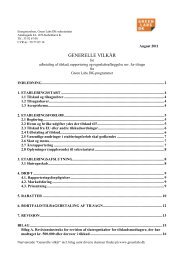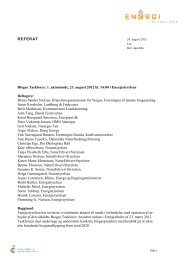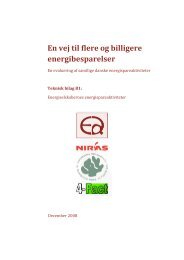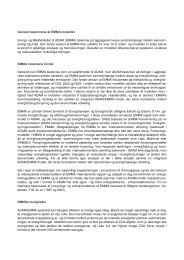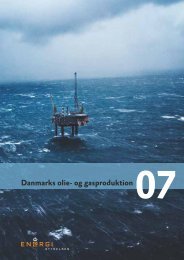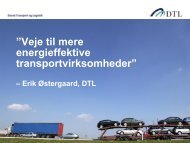Energy Strategy 2050 – from coal, oil and gas
Energy Strategy 2050 – from coal, oil and gas
Energy Strategy 2050 – from coal, oil and gas
Create successful ePaper yourself
Turn your PDF publications into a flip-book with our unique Google optimized e-Paper software.
The government’s strategy contains a wide range of<br />
initiatives to bring Denmark closer to its objective of<br />
an energy <strong>and</strong> transport system without fossil fuels by<br />
<strong>2050</strong>; initiatives which will also help meet the energy <strong>and</strong><br />
climate targets already set out in the short <strong>and</strong> medium<br />
term. The strategy will already have significant effects<br />
in the period 2011-2020, in the form of reduced use of<br />
fossil fuels, increased use of renewable energy, reduced<br />
energy consumption, cuts in greenhouse <strong>gas</strong> emissions<br />
<strong>and</strong> enhanced security of supply. With this strategy, the<br />
government is establishing a flexible framework for longterm<br />
efforts, but needless to say the transition will require<br />
further initiatives in the period after 2020 to realise the<br />
goal by <strong>2050</strong>.<br />
In addition to the benefits for the environment <strong>and</strong><br />
climate <strong>from</strong> the new initiatives, the strategy will also provide<br />
Danish companies with new opportunities to exploit<br />
the global green growth potential by ensuring stronger<br />
cohesion between innovation, production <strong>and</strong> sale of<br />
new technologies to the advantage of Danish exports.<br />
Phase-out of fossil fuels<br />
in the energy sector<br />
As appears <strong>from</strong> the government’s three tracks for the<br />
transition, the phase out of fossil fuels will take place at<br />
different rates. The transition will first be in the energy<br />
sector, whereas large-scale conversion of the transport<br />
sector is expected later, once the non-fossil based alternative<br />
fuels have become financially <strong>and</strong> technically more<br />
attractive.<br />
‘The largest contributions come <strong>from</strong> increased<br />
wind power, increased use of biomass <strong>and</strong><br />
energy efficiency<br />
The government’s new initiatives to improve energy efficiency<br />
<strong>and</strong> exp<strong>and</strong> renewable energy will already provide<br />
a significant reduction in the use of fossil fuels over the<br />
next ten years. With the initiatives the government is<br />
presenting, the use of fossil fuels in the energy sector will<br />
be cut by 33% by 2020 relative to the 2009 level. The<br />
greatest contribution to this reduction will come <strong>from</strong> the<br />
government’s initiatives to increase the use of biomass,<br />
bio<strong>gas</strong> <strong>and</strong> biofuels, exp<strong>and</strong> wind power <strong>and</strong> increase<br />
energy efficiency.<br />
400<br />
250<br />
0<br />
2009 2010 2011 2012 2013 2014 2015 2016 2017 2018 2019 2020<br />
Without initiatives With new initiatives<br />
PJ<br />
350<br />
300<br />
Figure 4.1 Fossil fuel use in the energy sector 2009-2020<br />
(excluding transport, extraction <strong>and</strong> refining).<br />
Source: Danish <strong>Energy</strong> Agency<br />
The electricity sector in particular will see a very significant<br />
reduction in the use of fossil fuels. With the government’s<br />
new initiatives, the share of renewable energy<br />
will account for more than 60% of overall electricity<br />
consumption in 2020, against 29% in 2009. Wind power<br />
alone will cover more than 40% of electricity consumption<br />
in 2020, compared with just 19% in 2009. A high<br />
share of renewables in the electricity supply also implies<br />
electrification of an ever greater share of energy consumption<br />
for transport, heating <strong>and</strong> industrial processes.<br />
<strong>Energy</strong> <strong>Strategy</strong> <strong>2050</strong> <strong>–</strong> <strong>from</strong> <strong>coal</strong>, <strong>oil</strong> <strong>and</strong> <strong>gas</strong> to green energy.<br />
33% reduction<br />
47



